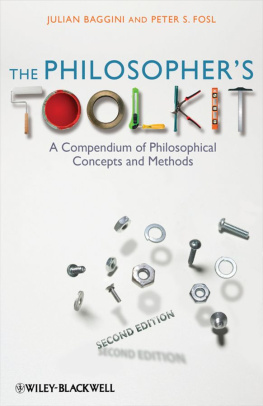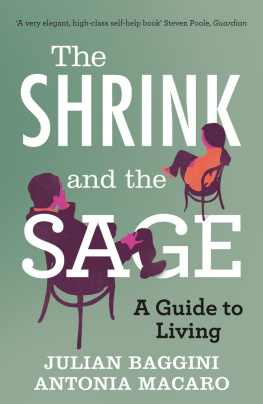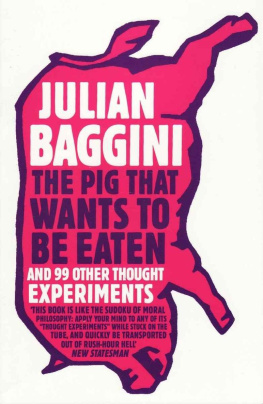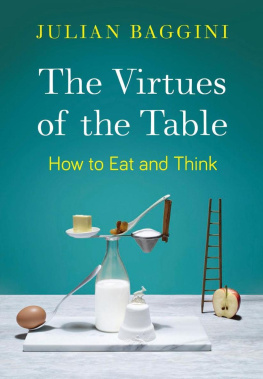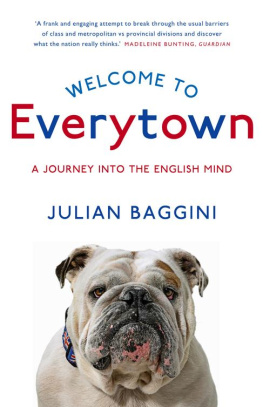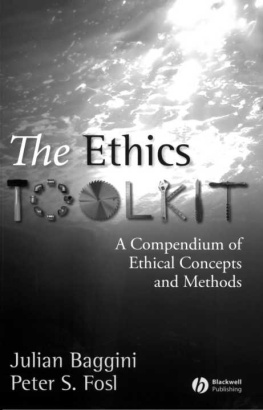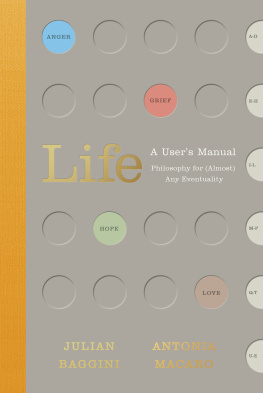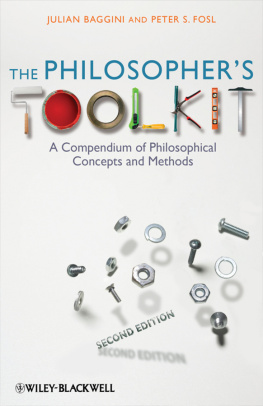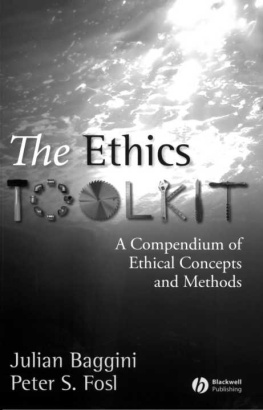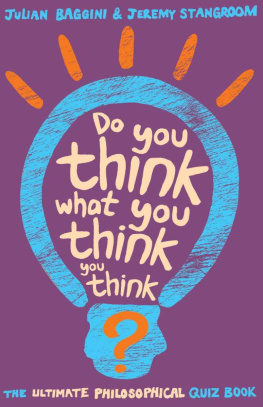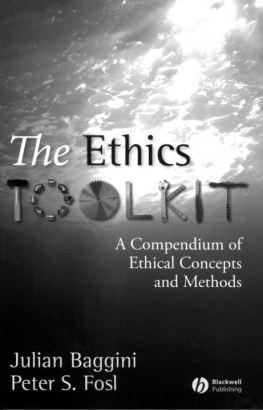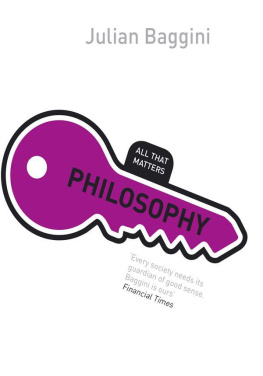Contents
Julian Baggini is editor and co-founder of The Philosophers Magazine (www.philosophersmag.com). He is the author of several books, including The Ethics Toolkit (with Peter S. Fosl, Wiley-Blackwell, 2007), Welcome to Everytown: A Journey into the English Mind (2008), Complaint (2008) and Should You Judge This Book by Its Cover? (2009). He has written for numerous newspapers and magazines, including the Guardian, the Financial Times, Prospect and the New Statesman, as well as for the think tanks the Institute of Public Policy Research and Demos.
Peter S. Fosl is Professor of Philosophy at Transylvania University in Lexington, Kentucky. He is co-author with Julian Baggini of The Ethics Toolkit (Wiley-Blackwell, 2007) and is also co-editor of the Dictionary of Literary Biography (2002) volumes on British philosophy, as well as coeditor with David E. Cooper of Philosophy: The Classic Readings (Wiley-Blackwell, 2009). Fosls scholarly publications address topics in scepticism, ethics, the philosophy of religion and the history of philosophy.
Praise for the first edition
The Philosophers Toolkit provides a welcome and useful addition to the introductory philosophy books available. It takes the beginner through most of the core conceptual tools and distinctions used by philosophers, explaining them simply and with abundant examples. Newcomers to philosophy will find much in here that will help them to understand the subject.
David S. Oderberg,
University of Reading
... the average person who is interested in arguments and logic but who doesnt have much background in philosophy would certainly find this book useful, as would anyone teaching a course on arguments, logic, and reasoning. Even introductory courses on philosophy in general might benefit because the book lays out so many of the conceptual tools which will prove necessary over students careers.
About.com
Its choice of tools for basic argument ... is sound, while further tools for argument ... move through topics and examples concisely and wittily ... Sources are well chosen and indicated step by step. Sections are cross-referenced (making it better than the Teach Yourself 100 philosophical concepts) and supported by a useful index.
Reference Reviews

This second edition first published 2010
2010 Julian Baggini and Peter S. Fosl
Edition history: Blackwell Publishing Ltd (1e, 2003)
Blackwell Publishing was acquired by John Wiley & Sons in February 2007. Blackwells publishing program has been merged with Wileys global Scientific, Technical, and Medical business to form Wiley-Blackwell.
Registered Office
John Wiley & Sons Ltd, The Atrium, Southern Gate, Chichester, West Sussex, PO19 8SQ, United Kingdom
Editorial Offices
350 Main Street, Malden, MA 02148-5020, USA
9600 Garsington Road, Oxford, OX4 2DQ, UK
The Atrium, Southern Gate, Chichester, West Sussex, PO19 8SQ, UK
For details of our global editorial offices, for customer services, and for information about how to apply for permission to reuse the copyright material in this book please see our website at www.wiley.com/wiley-blackwell.
The right of Julian Baggini and Peter S. Fosl to be identified as the authors of this work has been asserted in accordance with the UK Copyright, Designs and Patents Act 1988.
All rights reserved. No part of this publication may be reproduced, stored in a retrieval system, or transmitted, in any form or by any means, electronic, mechanical, photocopying, recording or otherwise, except as permitted by the UK Copyright, Designs and Patents Act 1988, without the prior permission of the publisher.
Wiley also publishes its books in a variety of electronic formats. Some content that appears in print may not be available in electronic books.
Designations used by companies to distinguish their products are often claimed as trademarks. All brand names and product names used in this book are trade names, service marks, trademarks or registered trademarks of their respective owners. The publisher is not associated with any product or vendor mentioned in this book. This publication is designed to provide accurate and authoritative information in regard to the subject matter covered. It is sold on the understanding that the publisher is not engaged in rendering professional services. If professional advice or other expert assistance is required, the services of a competent professional should be sought.
Library of Congress Cataloging-in-Publication DataBaggini, Julian.
The philosophers toolkit : a compendium of philosophical concepts and methods / Julian Baggini and Peter S. Fosl. 2nd ed. p. cm.
Includes bibliographical references and index.
ISBN 978-1-4051-9018-3 (pbk. : alk. paper) 1. Reasoning. 2. Methodology. I. Fosl, Peter S. II. Title.
BC177.B19 2010
101-dc22
2009042655
For Rick ONeil, colleague and friend, in memoriam
Alphabetical Table of Contents
4.1 Apriori/a posteriori
2.1 Abduction
4.2 Absolute/relative
3.1 Alternative explanations
3.2 Ambiguity
2.4 Analogies
4.3 Analytic/synthetic
2.5 Anomalies and exceptions that prove the rule
5.1 Aphorism, fragment, remark
1.1 Arguments, premises and conclusions
1.9 Axioms
7.1 Basic beliefs
3.3 Bivalence and the excluded middle
4.4 Categorical/modal
5.2 Categories and specific differences
3.4 Category mistakes
1.11 Certainty and probability
3.5 Ceteris paribus
3.6 Circularity
6.1 Class critique
3.7 Conceptual incoherence
4.5 Conditional/biconditional
1.6 Consistency
3.8 Counterexamples
3.9 Criteria
6.8 Critiques of naturalism
6.2 Deconstruction and the critique of presence
1.2 Deduction
4.7 Defeasible/indefeasible
1.10 Definitions
4.6 De re/de dicto
2.3 Dialectic
5.3 Elenchus and aporia
6.3 Empiricist critique of metaphysics
4.8 Entailment/implication
3.10 Error theory
4.9 Essence/accident
1.7 Fallacies
3.12 False cause
3.11 False dichotomy
6.4 Feminist critique
6.5 Foucaultian critique of power
3.13 Genetic fallacy
7.2 Gdel and incompleteness
6.6 Heideggerian critique of metaphysics
3.14 Horned dilemmas
5.4 Humes fork
2.2 Hypothetico-deductive method
5.5 Indirect discourse
1.3 Induction
4.10 Internalism/externalism
2.6 Intuition pumps
1.5 Invalidity
3.15 Is/ought gap
4.11 Knowledge by acquaintance/description
6.7 Lacanian critique
5.6 Leibnizs law of identity
2.7 Logical constructions
3.16 Masked man fallacy
7.4 Mystical experience and revelation
4.12 Necessary/contingent
4.13 Necessary/sufficient
6.9 Nietzschean critique of Christian-Platonic culture
4.14 Objective/subjective
5.7 Ockhams razor
7.5 Paradoxes
3.17 Partners in guilt
5.8 Phenomenological method(s)
7.3 Philosophy and/as art
7.6 Possibility and impossibility
6.10 Pragmatist critique
7.7 Primitives
3.17 Principle of charity
3.18 Question-begging
4.15 Realist/non-realist
2.8 Reduction
3.19 Reductios
3.20 Redundancy

